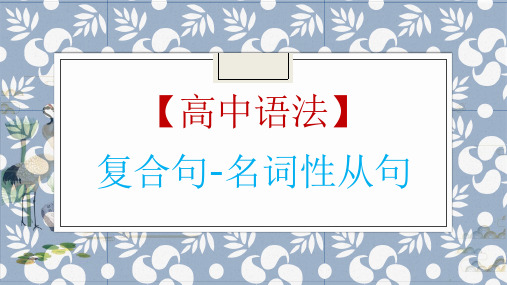高考英语语法一轮复习:名词课件(共15张PPT)
合集下载
名词课件-高考英语一轮复习

Eg: army; audience; crew; family; team; police; government; public 集体名词有时作单数看待,有时作复数看。一般来说,视为整体时作单数看, 突出它的成员时作复数看。
His family __i_s__ not large. (be)
His family _a__r_e__ all music lovers. (be)
专有名词 (Proper Nouns)
普通名词 (Common Nouns)
抽象名词(Abstract Nouns) 物质名词(Material Nouns) 集体名词(Collective Nouns) 个体名词(Individual Nouns)
不可数名词 (Uncountable Nouns)
①stomach 的复数形式为stomachs,因为词尾的-ch 发/k/,而不发/t∫/。
②以-th 结尾的名词,只加-s。
例如: bath-baths 沐浴
month--months月
3、以“辅音+y”结尾的名词,先把y变成i,再加上-es [iz]. factories、countries、cities、babies
一、可数名词
(一)、可数名词复数形式的规则变化:
5、以”辅音字母+o”结尾的名词,加-es [iz]
【注意】
有些以-o结尾的名词加-s 或-es 均可。
例如: zero-zeros/zeroes 零
motto-mottos/mottoes格言
一、可数名词
(一)、可数名词复数形式的规则变化:
6、以f和fe结尾的名词的复数有三种情况:
一、可数名词
(一)、可数名词复数形式的规则变化:
His family __i_s__ not large. (be)
His family _a__r_e__ all music lovers. (be)
专有名词 (Proper Nouns)
普通名词 (Common Nouns)
抽象名词(Abstract Nouns) 物质名词(Material Nouns) 集体名词(Collective Nouns) 个体名词(Individual Nouns)
不可数名词 (Uncountable Nouns)
①stomach 的复数形式为stomachs,因为词尾的-ch 发/k/,而不发/t∫/。
②以-th 结尾的名词,只加-s。
例如: bath-baths 沐浴
month--months月
3、以“辅音+y”结尾的名词,先把y变成i,再加上-es [iz]. factories、countries、cities、babies
一、可数名词
(一)、可数名词复数形式的规则变化:
5、以”辅音字母+o”结尾的名词,加-es [iz]
【注意】
有些以-o结尾的名词加-s 或-es 均可。
例如: zero-zeros/zeroes 零
motto-mottos/mottoes格言
一、可数名词
(一)、可数名词复数形式的规则变化:
6、以f和fe结尾的名词的复数有三种情况:
一、可数名词
(一)、可数名词复数形式的规则变化:
高考英语复习:名词 PPT课件 图文

典例 (江西)The ________shoes were
covered with mud, so I asked them to
take them off before they got into
________car.
A. girl’s; Tom’s B. girls’; Toms’
C. girls’; Tom’s
3.总是表示复数意义的名词 集体名词people, police, cattle总是表示复
数意义,不能说a people, a police, a cattle,但可以说a person, a policeman, a head of cattle。
The police are searching for the stolen boy.
5.合成名词的复数
①把主体名词变成复数,如:lookers-on, editors-in-chief(总编辑), fathers-in- law(岳父)。
②没有主体名词时,在词尾加-s,如: grown-ups(成年人), go-betweens(中间 人)。
二、名词间的相互转化 1.物质名词转化为可数名词 物质名词一般为不可数名词,但有些物质
对于单复数同形的名词,一定要从题中找 出关键信息(如谓语动词的单复数形式), 来确定其到底是表示单数意义还是复数意 义。
典例 (·西安第三次质检,14) Every possible means ________, but it seems that nothing will prevent the situation from getting worse.
①Do you have a dictionary? ②He shook his head sadly.
高考英语统考一轮复习 第一章 名词参考课件 新人教版

Some deer are eating grass at the bottom of the hill.
有一些鹿正在山下吃草。(deer单复数同形)
Every possible means has been tried, but none proves successful.
每一种可能的方式都尝试了,但没有一个证明是成功的。
joy
抽象名词意义 青春; 青年时期
必要性 欢乐
具体化名词意义 青年们 必需品
令人高兴的事
Your contribution will certainly make the event a huge success. 你的贡献一定会使这个事件很成功。 Five hundred youths from all over the country will attend this meeting. 来自全国的五百名青年将参加本次会议。 They are failures as artists, but successes as teachers. 作为艺术家他们是失败者,但作为教师是成功者。
另外,有些抽象名词的复数形式用来表示数量之多,以示强调,如: congratulations, regards, respects, thanks, wishes, apologies, smiles, pities, fears, hopes, kindnesses等。如: I offered my congratulations on her success. 我对她的成功表示了祝贺。 He was in all smiles. 他满脸笑容。
the name of the girl over there那边那位女孩的名字
3. 双重所有格 指“名词+of+名词所有格”或“名词+of+名词性物主代词”。 a play of Shakespeare's莎士比亚的一个戏剧 a friend of mine我的一个朋友
2023届高考英语一轮复习名词课件

food食物→foods 多种食物所有格表示所有关系,修饰另一名词,可作定语等。 它有两种形式:名词词尾加 -’s 所有格,“of 加名词”所 有格。
-’s 所有格的构成
构成方法
例
一般情况下,在单数名词词尾加 -’s
Phip's new address 菲利普的新地址
最后一个单词的词尾加 -s
man, woman, lord为复合名词的第一部分, woman doctor → women doctors 将两部分都变为复数形式
注意:
(1)同一名词表示不同意义时,复数可能不一样。 ① works表示“工厂”时,单复数同形,但表示“著作”时,单数为work, 复数为 works。
注:work(工作), change(零钱 ).
可转化为可数名词的不可数名词:
(1)抽象名词表示具体事物时是可数的,可被a/an修饰,也有复
数形式,表示“某种人或事”;
(2)有些不可数名词在表达不同意义时,是可数名词;
(3)某些不可数名词前有形容词修饰时,可以和a/an连用。
a success
一个成功的人,一件成功的事
3. Cathy suffered some terrible______(ill) in her earty childhood. After years of regular treatment, she finallybecame healthy.
一些由两部分组成的物体的名词只有复数形式,这 类名词不能用具体数字直接修饰,也不能加定冠词 a/an, 但可用 a pair of 或 many 等修饰
trousers(裤子),shorts(短裤), jeans(牛仔裤), glasses(眼镜),pants(裤子),socks(袜子), shoes(鞋)
高考英语一轮复习英语语法专题复习名词性从句讲解教学课件-PPT

真题解析
His presentation will show you contexts. A. that you have observed B. that how you have observed C. how that you have observed D. how what you have observed
模拟题解析
As they usually receive the same score in standardized
examinations, there is often disagreement as to
is the
better student, Bob or Helen.
A. which
better student, Bob or Helen.
A. which
B. who
C. whom
D. whose
【解析】句意为“因为鲍勃和海伦在考试中总是得到同样的分数, 所以关于他们俩谁是更好的学生,总是有分歧”。
宾语从句 Object Clause
(2) 宾语从句的位置: a. 放在主句谓语动词(及物动词)之后
宾语从句 Object Clause
(2) 宾语从句的位置: c. 可由形式宾语it代替,而从句本身放在句子末尾。
(1) 宾语从句的连接词★ : a. 由that引导; b. 由whether/if引导; c. 由连接代词what, which, who, whatever, whichever, whoever等引导; d. 由连接副词when, where, why, how等引导。
真题解析
【2016阅读】 He hopes that whoever finds the loot will relish the riches and the adventure of finding them.
高考一轮复习英语基础语法专项复习ppt名词

①、可数名词有单数和复数两种形式。
②、单数名词与冠词a/an连用。表示数量为“一”
③、可数名词有复数形式,表示数量“大于一”。 可以用数词来修饰复数名词,来表示名词的具体 数量。如果要表示可数名词的不确切的数量,可 以用some,many,a lot of等修饰。
名词变复数的规则变化
名词的复数形式变化规则
高考一轮复习英语基础语法专项复 习ppt名词
名词 是词类的一种,也是实词的 一种,名词表示人或事物名称的词。
名普
词
通 名
词
专有名词
可数名词
不可数 名词
个体名词 集体名词 物质名词 抽象名词
专有名词
①、表示某一特定的人、月份、周、日、节 日、地名、团体、机构、组织等。 ②、表示独一无二的事物。 ③、前面一般不加冠词。 ④、首字母要大写。
3)these kind 作主语 4) both…and…. 修饰主语 5) A number of; large quantities of; large amounts of修饰主语
6) the+ 形容词作主语,一般情况下 7) one of the+可数名词复数+定语从句,从句中谓语动词用复数。
不可数名词
①、不可数名词没有复数形式,在句子中一 般被视为单数。不和a/an连用,可以和the连 用。
②、如果表示不可数名词的确切数量,可以 在不可数名词前加上单位词。如果表示要不 可数名词的不确切数量,可以用some,much,a little,a lot of ,a bit of ,plenty of等 修饰。
a glass ( 玻璃杯 ) a copper ( 铜币/板 ) a tin ( 罐头,听头 ) a paper ( 报纸,证件,论文 ) an iron (熨斗 ) a wood ( 树林 ) a gold (金牌 ) a youth (年青人 ) a power ( 大国 ) a beauty ( 美人,美的东西 ) a pleasure( 使人感到愉快的事 ) a relation(亲戚)
②、单数名词与冠词a/an连用。表示数量为“一”
③、可数名词有复数形式,表示数量“大于一”。 可以用数词来修饰复数名词,来表示名词的具体 数量。如果要表示可数名词的不确切的数量,可 以用some,many,a lot of等修饰。
名词变复数的规则变化
名词的复数形式变化规则
高考一轮复习英语基础语法专项复 习ppt名词
名词 是词类的一种,也是实词的 一种,名词表示人或事物名称的词。
名普
词
通 名
词
专有名词
可数名词
不可数 名词
个体名词 集体名词 物质名词 抽象名词
专有名词
①、表示某一特定的人、月份、周、日、节 日、地名、团体、机构、组织等。 ②、表示独一无二的事物。 ③、前面一般不加冠词。 ④、首字母要大写。
3)these kind 作主语 4) both…and…. 修饰主语 5) A number of; large quantities of; large amounts of修饰主语
6) the+ 形容词作主语,一般情况下 7) one of the+可数名词复数+定语从句,从句中谓语动词用复数。
不可数名词
①、不可数名词没有复数形式,在句子中一 般被视为单数。不和a/an连用,可以和the连 用。
②、如果表示不可数名词的确切数量,可以 在不可数名词前加上单位词。如果表示要不 可数名词的不确切数量,可以用some,much,a little,a lot of ,a bit of ,plenty of等 修饰。
a glass ( 玻璃杯 ) a copper ( 铜币/板 ) a tin ( 罐头,听头 ) a paper ( 报纸,证件,论文 ) an iron (熨斗 ) a wood ( 树林 ) a gold (金牌 ) a youth (年青人 ) a power ( 大国 ) a beauty ( 美人,美的东西 ) a pleasure( 使人感到愉快的事 ) a relation(亲戚)
高考英语一轮复习:语法基础部分词性名词课件
(二)可数名词的单复数
1.规则性变化
(1)在单数名词词尾加s map maps boy boys horse horses
(2)s,o,x,sh,ch结尾的词加es. class classes box boxes hero heroes
【注】
以o结尾的词,变复数时加s/se.
①+s:photo→photos,piano→pianos; ②+s:potato(马铃薯)tomato(西红柿)hero(英雄) motto (黑人) volcano(火山)
①There is a table and four chairs in the room. ②Either you or he is right. ③Neither you nor I am going there.
9.主语中有with的短语时,谓语单复数由with之前的人物决定。 A woman with a 7-year-old child was standing at the side of the road.
7.and ①连接两个名词做主语时,谓语用复数; ②两个名词构成一个整体事物时,谓语用单数。
①The teacher and his son are picking apples now ②Fish and chips is very famous food.
8.就近原则 ①There be 句型; ②either...or...或neither...nor...。
补充:就远原则
as well as;(together/along) with;rather than; except;besides;but;including;in addition to; apart from
高考英语名词高考名词专题复习PPT课件
第6页/共26页
(6) 合成名词的复数形式: ①将合成名词中的主体名词变为复数: looker(s)-on, passer(s)-by, mother(s)-in-law
②将最后一部分变为复数: grown-up(s), go-between(s) (中间人), good-for-nothing(s) (无用之人)
第1页/共26页
1. 可数名词的复数
给出下列名词的复数形式
policeman
child
shelf roof life
mouse baby
tooth foot potato hero
leaf
monkey branch thief mosquito
policemen children mice
teeth
③含boy, girl, lady等的合成的名词: 它们始终为单数,其后的名词则用复数形式。 如: boy students, girl friends, lady drivers
④含man或 woman的合成名词: 它们随其后名词单复数的变化而变化。如: a man doctor, two men doctors
第8页/共26页
B>有些名词单复数形式含义特别
常见woods (森林) works (工厂)
waters (水域)
clothes (衣服)
customs (海关) manners (礼貌)
sands (沙滩) spirits (精神,烈酒)
feelings (感情) goods (货物) papers (报纸,文件) surroundings (环境)
woods(森林), works(工厂) (6) 有没有s结尾意义不同:
(6) 合成名词的复数形式: ①将合成名词中的主体名词变为复数: looker(s)-on, passer(s)-by, mother(s)-in-law
②将最后一部分变为复数: grown-up(s), go-between(s) (中间人), good-for-nothing(s) (无用之人)
第1页/共26页
1. 可数名词的复数
给出下列名词的复数形式
policeman
child
shelf roof life
mouse baby
tooth foot potato hero
leaf
monkey branch thief mosquito
policemen children mice
teeth
③含boy, girl, lady等的合成的名词: 它们始终为单数,其后的名词则用复数形式。 如: boy students, girl friends, lady drivers
④含man或 woman的合成名词: 它们随其后名词单复数的变化而变化。如: a man doctor, two men doctors
第8页/共26页
B>有些名词单复数形式含义特别
常见woods (森林) works (工厂)
waters (水域)
clothes (衣服)
customs (海关) manners (礼貌)
sands (沙滩) spirits (精神,烈酒)
feelings (感情) goods (货物) papers (报纸,文件) surroundings (环境)
woods(森林), works(工厂) (6) 有没有s结尾意义不同:
2020版人教版高考英语一轮课件:基础语法 名词(共69张PPT)
不可数名词 :无复数;前面不可直接加a,an 或名词;表数量用a piece of 之类的结构
单
名 词
复 数
一般加S:guy, section, material, adult, procedure, aspect
以s,x,sh,ch结尾,加es: mass, box,
brush, branch, 但stomach加s
根据句意及空格前的a可知,此处填名词,表 示“科学家”,故填scientist。
15. (2016全国Ⅰ卷) But for tourists like me, pandas are its top __a_tt_r_a_c_ti_o_n__ (attract).
在“形容词性物主代词(its)+形容词(top)”后应填 名词,attraction指“吸引人的事物”。
加es: volcano, hero, potato, tomato
单复同行:series, sheep, deer, fish, Chinese
oo →ee:tooth, foot, goose 不
名 词
单 复 数
可数: 单→复
规 man →men: spokesman, spokeswoman
3. (2017全国Ⅱ卷) It ran for just under seven kilometers and allowed people to avoid terrible _c_r_o_w_d_s__(crowd) on the roads…
根据常识,不同公路上上下班的人群肯定不是一 群人,而是一群一群的人,无数群的人,故填其 复数形式crowds。
在句中做主语或冠词后应当用名词,change除 作动词外也可作名词;其后的谓语动词是are, 根据主谓一致原则,主语也应是复数,故填 change的复数形式changes。
高考英语名词(高考名词专题复习)课件精选课件
calf
passer-by
go-
between
grown-up
girl friend
sister-in-law man servant looker-on
watches ladies foxes flies brushes
tomatoes inches halves kilos pianos
calves passers-by
(为…做贡献)
(9)名词单复数意义不同的短语: • Have a word with sb. (与…某人说句话) • Have words with sb. (与…某人吵架) • Make cloth (织布) • Make clothes (制衣)
一:’s型用法(有生命的所有格)
• 1.有生命的所有格
(7) 姓氏后加s并带冠词,表一家人或夫妇俩:
the Greens ;the Chengs
(8) 名词单复数形式意义相同的短语:
• make faces / a face(做鬼脸) • Have talks / a talk with sb.(与某人交谈) • Play jokes / a joke on (拿…开玩笑) • Make contributions / a contribution to
3. 物质名词有前置定语修饰时,前面要使用不定冠词。 have breakfast have a wonderful breakfast
The road is covered with snow. They have a heavy snow every year.
Time and tide wait for no man. We had a wonderful time last night.
- 1、下载文档前请自行甄别文档内容的完整性,平台不提供额外的编辑、内容补充、找答案等附加服务。
- 2、"仅部分预览"的文档,不可在线预览部分如存在完整性等问题,可反馈申请退款(可完整预览的文档不适用该条件!)。
- 3、如文档侵犯您的权益,请联系客服反馈,我们会尽快为您处理(人工客服工作时间:9:00-18:30)。
(2)改变字母:man --men, woman --women, policeman --policemen, saleswoman --saleswomen, foot --feet, tooth --teeth, goose --geese, Mouse --Mice ,
另: penny (pence或 pennies) (3)增加字母: child --children, ox --oxen
(为…做贡献)
(10)名词单复数意义不同的短语: • Have a word with sb. (与…某人说句话) • Have words with sb. (与…某人吵架) • Make cloth (织布) • Make clothes (制衣)
三、名词的格 (Case)
A:通格(Common case): 主格 (Subject case)
宾格 (Object case)
B:所有格(Possessive case)
1. ~’s属格: 原则上只用于表示有生命的人或物的名词。如: the teacher’s book; the horse’s tail 然而,时间、距离、太阳、地球、月亮、江河、 海洋、船只、国家、城市、团体机构等名词也 可以用~’s属格。如:today’s newspaper; the city’s transportation
(2) 只有复数形式的名词:
clothes, trousers, jeans, twins, glasses,
compasses(指南针), scissors(剪刀), handcuffs(手铐), goods ,thanks, wishes
(5) 以s结尾但不表示复数:
mathematics数学, physics物理学, politics政治, statistics统计学, news新闻,消息,
(9) 名词单复数形式意义相同的短语: • make faces / a face(做鬼脸) • Have talks / a talk with sb.(与某人交谈) • Play jokes / a joke on (拿…开玩笑) • Make contributions / a contribution to
Grammar 名词
(Nouns)
一、分类 (Classification)
A:专有名词 (Proper nouns) B:普通名词 (Common nouns)
Countable nouns Uncountable nouns
(可数名词)
(不可数名词)
Individual Nouns (个体名词)
a man doctor, two men doctors
(9)名词只能用复数形式的短语: • do exercises (做操) • take notes (做笔记) • take turns (轮流) • make repairs (搞修理) • change trains (改换火车) • make friends with (交朋友) • shake hands with (握手) • as follows (如下) • in rags (衣衫褴褛) • in dozens (成打的)
(2)以-s, -x, -ch, -sh结尾的词在词尾加-es (3)以辅音字母加y结尾的词,变y为i再加-es (4)以f或fe结尾的词,应变f或fe为v再加-es
2. 不规则名词单复数变化:
(1)单复数同形:sheep, deer, fish, works(工厂), Chinese, Japanese, Swiss
the Greens ;the Chengs
(8) 合成名词的复数形式:
①将合成名词中的主体名词变为复数:
looker(s)-on, passer(s)-by, mother(s)-in-law
旁观者
过路人
岳母
②将最后一部分变为复数:
grown-up(s), go-between(s) (中间人),
good-for-nothing(s) (无用之人)
③含boy, girl, lady等的合成的名词: 它们始终为单数,其后的名词则用复数形式。 如: boy students, girl friends, lady drivers
④含man或 woman的合成名词: 它们随其后名词单复数的变化而变化。如:
变f为v再加es:life, wife, knife, half, leaf, wolf, thief
另外:handkerchief (handkerchiefs或handkerchieves)
3. 名词单复数的特殊情况:
(1) 集体名词:police , cattle , people ,
poultry(家禽), the youth
woods(森林), works(工厂)
(6) 有没有s结尾意义不同:
glass –glasses sand(沙,沙子) –sands(沙漠), wood –woods, time –times(时代), paper –papers(论文), green –greens(青菜), custom –customs(海关), spirit –spirits(酒精,情绪), light –lights(灯), experience(经验) –experiences(经历), arm –arms(武器), compass(指南针) –compasses(圆规), (7) 姓氏后加s并带冠词,表一家人或夫妇俩:
Abstract Nouns (抽象名词 )
Collective Nouns (集体名词 )
Material Nouns (物质名词 )
二、数(Number)
A: Singular number (单数) B: Plural number (复数)
1.规则名词单复数变化:
(1)一般的词,包括元音字母加y结尾的词,直接 在词尾加-s
(4)以o结尾的词: 加s: photo, radio, piano, zoo, studio, bamboo
加es: tomato, potato, hero, Negro, mango 另:zero (zeros或 zeroes)
(5)以f或fe结尾的词: 直接加s:roof, proof, belief
另: penny (pence或 pennies) (3)增加字母: child --children, ox --oxen
(为…做贡献)
(10)名词单复数意义不同的短语: • Have a word with sb. (与…某人说句话) • Have words with sb. (与…某人吵架) • Make cloth (织布) • Make clothes (制衣)
三、名词的格 (Case)
A:通格(Common case): 主格 (Subject case)
宾格 (Object case)
B:所有格(Possessive case)
1. ~’s属格: 原则上只用于表示有生命的人或物的名词。如: the teacher’s book; the horse’s tail 然而,时间、距离、太阳、地球、月亮、江河、 海洋、船只、国家、城市、团体机构等名词也 可以用~’s属格。如:today’s newspaper; the city’s transportation
(2) 只有复数形式的名词:
clothes, trousers, jeans, twins, glasses,
compasses(指南针), scissors(剪刀), handcuffs(手铐), goods ,thanks, wishes
(5) 以s结尾但不表示复数:
mathematics数学, physics物理学, politics政治, statistics统计学, news新闻,消息,
(9) 名词单复数形式意义相同的短语: • make faces / a face(做鬼脸) • Have talks / a talk with sb.(与某人交谈) • Play jokes / a joke on (拿…开玩笑) • Make contributions / a contribution to
Grammar 名词
(Nouns)
一、分类 (Classification)
A:专有名词 (Proper nouns) B:普通名词 (Common nouns)
Countable nouns Uncountable nouns
(可数名词)
(不可数名词)
Individual Nouns (个体名词)
a man doctor, two men doctors
(9)名词只能用复数形式的短语: • do exercises (做操) • take notes (做笔记) • take turns (轮流) • make repairs (搞修理) • change trains (改换火车) • make friends with (交朋友) • shake hands with (握手) • as follows (如下) • in rags (衣衫褴褛) • in dozens (成打的)
(2)以-s, -x, -ch, -sh结尾的词在词尾加-es (3)以辅音字母加y结尾的词,变y为i再加-es (4)以f或fe结尾的词,应变f或fe为v再加-es
2. 不规则名词单复数变化:
(1)单复数同形:sheep, deer, fish, works(工厂), Chinese, Japanese, Swiss
the Greens ;the Chengs
(8) 合成名词的复数形式:
①将合成名词中的主体名词变为复数:
looker(s)-on, passer(s)-by, mother(s)-in-law
旁观者
过路人
岳母
②将最后一部分变为复数:
grown-up(s), go-between(s) (中间人),
good-for-nothing(s) (无用之人)
③含boy, girl, lady等的合成的名词: 它们始终为单数,其后的名词则用复数形式。 如: boy students, girl friends, lady drivers
④含man或 woman的合成名词: 它们随其后名词单复数的变化而变化。如:
变f为v再加es:life, wife, knife, half, leaf, wolf, thief
另外:handkerchief (handkerchiefs或handkerchieves)
3. 名词单复数的特殊情况:
(1) 集体名词:police , cattle , people ,
poultry(家禽), the youth
woods(森林), works(工厂)
(6) 有没有s结尾意义不同:
glass –glasses sand(沙,沙子) –sands(沙漠), wood –woods, time –times(时代), paper –papers(论文), green –greens(青菜), custom –customs(海关), spirit –spirits(酒精,情绪), light –lights(灯), experience(经验) –experiences(经历), arm –arms(武器), compass(指南针) –compasses(圆规), (7) 姓氏后加s并带冠词,表一家人或夫妇俩:
Abstract Nouns (抽象名词 )
Collective Nouns (集体名词 )
Material Nouns (物质名词 )
二、数(Number)
A: Singular number (单数) B: Plural number (复数)
1.规则名词单复数变化:
(1)一般的词,包括元音字母加y结尾的词,直接 在词尾加-s
(4)以o结尾的词: 加s: photo, radio, piano, zoo, studio, bamboo
加es: tomato, potato, hero, Negro, mango 另:zero (zeros或 zeroes)
(5)以f或fe结尾的词: 直接加s:roof, proof, belief
